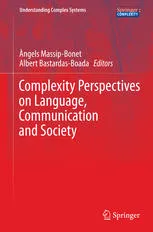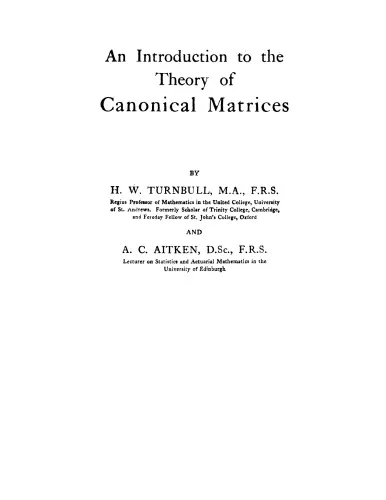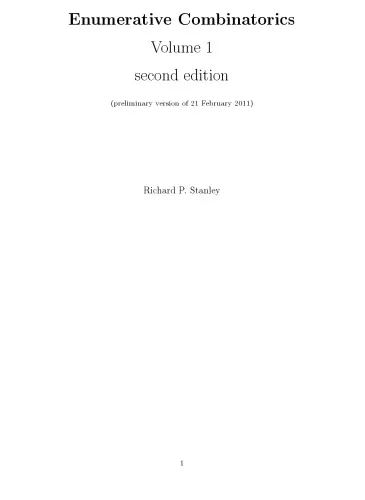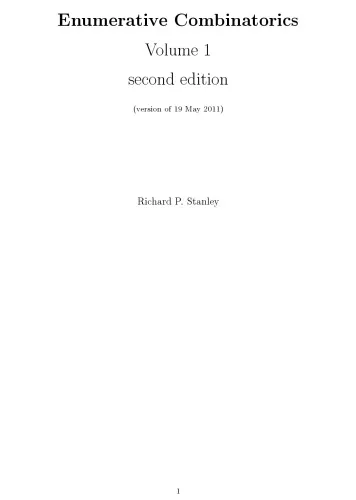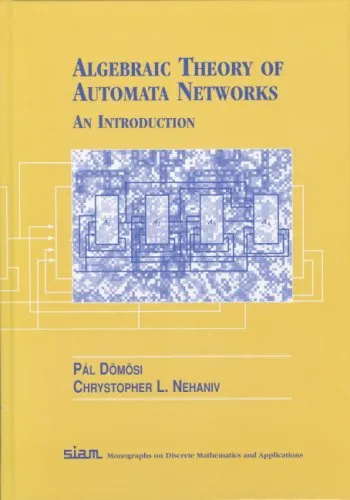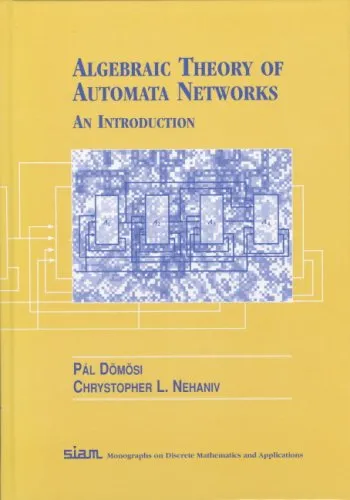Complexity Perspectives on Language, Communication and Society
4.7
بر اساس نظر کاربران

شما میتونید سوالاتتون در باره کتاب رو از هوش مصنوعیش بعد از ورود بپرسید
هر دانلود یا پرسش از هوش مصنوعی 2 امتیاز لازم دارد، برای بدست آوردن امتیاز رایگان، به صفحه ی راهنمای امتیازات سر بزنید و یک سری کار ارزشمند انجام بدینکتاب های مرتبط:
معرفی اجمالی کتاب
کتاب Complexity Perspectives on Language, Communication and Society توسط Àngels Massip-Bonet و Albert Bastardas-Boada نوشته شده و به تحلیل پیچیدگیهای زبان، ارتباطات و جامعه میپردازد. این اثر با بهرهگیری از نظریات مربوط به Complexity Sciences به بررسی چگونگی تعاملات و پویاییهای سیستمهای زبانی میپردازد و تلاش دارد تا فهم بهتری از زبان به عنوان یک پدیده پیچیده و پویا ارائه دهد.
خلاصهای از کتاب
در این کتاب، نویسندگان به بررسی دقیق چگونگی تحت تأثیر قرار گرفتن زبانها و سیستمهای ارتباطی توسط عوامل مختلف اجتماعی، فرهنگی و تاریخی پرداختهاند. آنها از طریق بهکارگیری تئوریهای Complexity Sciences، از جمله self-organization و emergent properties، به توضیح تعاملات میان اجزای مختلف زبان و اجتماعات زبانی میپردازند. این کتاب بر اهمیت درک زبان به عنوان یک سیستم پیچیده و متحول شونده تأکید دارد و به پژوهشگران و علاقهمندان راههای جدیدی برای مطالعه زبان و ارتباطات پیشنهاد میکند.
نکات کلیدی کتاب
- زبان به عنوان یک سیستم پویا و پیچیده.
- تأثیر Complexity Sciences در مطالعه زبان و ارتباطات.
- بررسی چگونگی تعاملات اجتماعی و تاریخی بر پویایی زبانها.
- ارائه دیدگاهی جدید و مبتکرانه در مورد مطالعه زبان.
- اهمیت self-organization و emergent properties در فهم زبان.
جملات معروف کتاب
"زبان به عنوان یک سیستم پویا، نه تنها بر پایه قواعد ثابت بل که بر اساس تعاملات مداوم و در حال تغییر بین افراد و اجتماعات شکل میگیرد."
"ارتباطات همیشه ساده نیست؛ آنها توانایی پیچیده شدن و ظهور ساختارهای جدید و منحصر به فرد را دارند."
چرا این کتاب مهم است؟
اهمیت این کتاب در نوآوری آن برای ارائه دیدگاههای جدید در مورد مطالعه زبان، به خصوص با استفاده از رویکرد Complexity Sciences است. این کتاب به طور ویژه برای پژوهشگران، دانشجویان و همه کسانی که به مطالعه زبان و تأثیر پیچیدگیهای اجتماعی بر زبان علاقهمند هستند، مفید واقع میشود. فهم دقیقتر ساختار پیچیده زبانها و چگونگی تعاملات و پویاییهای آنها میتواند ابزارهای مفیدی برای تحقیق و تحلیل در زمینههای مختلف اجتماعی و فرهنگی فراهم کند.
Introduction to "Complexity Perspectives on Language, Communication and Society"
"Complexity Perspectives on Language, Communication and Society" is a groundbreaking exploration of the intricate interplay between language, communication, and societal dynamics, all viewed through the lens of complexity science. Edited by Àngels Massip-Bonet and Albert Bastardas-Boada, this book ventures into uncharted territories, bringing interdisciplinary perspectives into focus to shed light on the emergent, self-organizing, and adaptive phenomena that shape human communication and interaction.
This volume provides readers with a robust theoretical framework to understand how complex systems theory can be applied to the study of language and communication, emphasizing the non-linear, dynamic, and interconnected nature of these domains. The book challenges traditional, reductionist perspectives and calls for a paradigm shift that embraces the fluid, networked qualities of human language and social behavior.
This work features contributions from renowned scholars and brings together diverse strands of research. It meticulously examines topics such as linguistic evolution, societal dynamics, and the emergent properties of communication systems. Whether you are an academic, researcher, or simply curious about how complexity theory intersects with language and society, this book offers new insights and deep reflections.
Detailed Summary of the Book
The book is organized into a collection of thought-provoking chapters that apply principles from complexity science to the realms of language and society.
Among the key concepts explored is the idea that language, far from being a static system, is a dynamically evolving phenomenon shaped by cultural, social, and interactive processes. The authors delve into how communication systems adapt to changing contexts, highlighting the role of interaction, feedback loops, and emergent patterns. The dynamic interplay of individual behavior and collective phenomena takes center stage, revealing how micro-level interactions build up into macro-level societal structures.
Importantly, the book also discusses the co-adaptive relationship between language and its speakers, viewing them as a coupled system in continuous transformation. The complex relationship between cognitive processes, social networks, and contextual factors is analyzed, showing the multifaceted influences that underpin linguistic phenomena.
Beyond language itself, the book explores the implications of communication on societal organization, power relations, and cultural shifts. It applies complexity perspectives to understand change and stability, bridging theoretical reflections with practical and empirical findings.
Key Takeaways
- The principle of emergence highlights how simple interactions among individuals can give rise to complex linguistic and societal structures.
- Language and communication are best seen as adaptive, non-linear, and dynamic systems, constantly evolving in response to internal and external pressures.
- Sociolinguistic phenomena cannot be fully understood using reductionist approaches—complex systems thinking is crucial to grasp the interconnectedness of social and communicative contexts.
- Interdisciplinary approaches that merge linguistics, sociology, and complexity science offer fresh, comprehensive insights into language and society.
Famous Quotes from the Book
"Language is not merely a tool for communication; it is a living, breathing organism, constantly shaped by the intricate web of interactions in which it exists."
"Understanding society through the lens of complexity allows us to appreciate the finely woven networks and emergent properties that define human interaction."
"Communication is a dance between order and disorder, structure and chaos, perpetually adapting to its environment."
Why This Book Matters
In a world that is growing increasingly complex, understanding the mechanisms of language and communication is more critical than ever. This book positions itself as a pivotal guide for anyone seeking clarity in these intricate domains.
By adopting a complexity perspective, the book offers an innovative lens to tackle pressing questions about how language and communication shape—and are shaped by—the societies in which they operate. It bridges theoretical foundations with real-world applications, making it a valuable resource for linguists, sociologists, complexity theorists, and policymakers alike.
In addition, "Complexity Perspectives on Language, Communication and Society" underscores the importance of interdisciplinary research and collaborative thinking. It inspires readers to think beyond the confines of traditional silos, fostering new methodologies and frameworks that could inform future explorations of human behavior and collective systems.
دانلود رایگان مستقیم
شما میتونید سوالاتتون در باره کتاب رو از هوش مصنوعیش بعد از ورود بپرسید
دسترسی به کتابها از طریق پلتفرمهای قانونی و کتابخانههای عمومی نه تنها از حقوق نویسندگان و ناشران حمایت میکند، بلکه به پایداری فرهنگ کتابخوانی نیز کمک میرساند. پیش از دانلود، لحظهای به بررسی این گزینهها فکر کنید.
این کتاب رو در پلتفرم های دیگه ببینید
WorldCat به شما کمک میکنه تا کتاب ها رو در کتابخانه های سراسر دنیا پیدا کنید
امتیازها، نظرات تخصصی و صحبت ها درباره کتاب را در Goodreads ببینید
کتابهای کمیاب یا دست دوم را در AbeBooks پیدا کنید و بخرید
1545
بازدید4.7
امتیاز0
نظر98%
رضایتنظرات:
4.7
بر اساس 0 نظر کاربران
Questions & Answers
Ask questions about this book or help others by answering
No questions yet. Be the first to ask!
